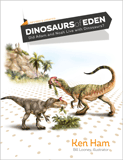Antique Protein
An incredible discovery that shocked the “millions of years” camp is back—with further verification.
News Source
Ten years ago, anyone—scientist or otherwise—claiming to have discovered soft (i.e., unfossilized) dinosaur tissue would have been ridiculed and dismissed by the scientific community as a quack or a young-earth creationist. Yet within the last decade have come two such crushing blows to the idea that dinosaurs died out some 65 million years ago.
“Our T. rex discovery was not a unique occurrence.”
The first was the discovery of unfossilized dinosaur tissue at the center of a T. rex bone by Mary Schweitzer of North Carolina State University. That discovery—and, specifically, papers published by Schweitzer and Beth Israel Deaconess Medical Center scientist John Asara—started an intense debate about whether the bones truly contained dinosaur tissue (see News to Note, August 2, 2008, item #2).
Now Asara and Schweitzer have supported their previous find by confirming the existence of proteins in the soft tissues of a hadrosaur, a duck-billed dinosaur allegedly from 80 million years ago. Their new study, reported in Science, shows that “our T. rex discovery was not a unique occurrence,” said Asara, who continued:
“This is the second dinosaur species we’ve examined and helps verify that our first discovery was not just a one-hit wonder. Our current study was the collaborative effort of a number of independent laboratories, whose findings collectively add up to a robust conclusion.”
According to Asara, the team found nearly twice the number of amino acids that were found in the T. rex tissue. The fragments “showed marked preservation of original tissues and molecules, with microstructures resembling soft, transparent vessels, cells and fibrous matrix,” despite the fact that the fossil was found buried some 23 feet (7 m) deep in sandstone. The proteins the team confirmed were collagen, laminin, and elastin, as well amino acids including hydroxylated proline.
As with previous studies, similarities between the dinosaur proteins and those of chicken and ostrich are being held up as evidence that dinosaurs evolved into birds. Dr. David DeWitt responded to this claim the last time it was brought up.
Furthermore, it seems strange that dinosaur soft tissue from 80 million years ago would ever be a convincing exhibit in support of evolution (and the millions of years it would have required). “At the heart of the controversy is the idea that ancient protein can exist at all. When an animal dies, protein immediately begins to degrade and, in the case of fossils, is slowly replaced by mineral, a substitution process assumed to be complete by 1 million years,” ScienceDaily reports.
But evolutionists have their presuppositions, too, and one of them is the fixity of the fossil record and millions of years. ScienceDaily concludes, “But with this latest evidence, it appears that some proteins do indeed have real staying power.” The unchanging assumption is millions of years, even if the facts have to be bent to fit into that framework.
Further Reading
- What Really Happened to the Dinosaurs?
- Why Shouldn’t Christians Accept Millions of Years?
- Did Dinosaurs Turn into Birds?
For More Information: Get Answers
Remember, if you see a news story that might merit some attention, let us know about it! (Note: if the story originates from the Associated Press, FOX News, MSNBC, the New York Times, or another major national media outlet, we will most likely have already heard about it.) And thanks to all of our readers who have submitted great news tips to us. If you didn’t catch all the latest News to Know, why not take a look to see what you’ve missed?
(Please note that links will take you directly to the source. Answers in Genesis is not responsible for content on the websites to which we refer. For more information, please see our Privacy Policy.)
Recommended Resources

Answers in Genesis is an apologetics ministry, dedicated to helping Christians defend their faith and proclaim the good news of Jesus Christ.
- Customer Service 800.778.3390
- Available Monday–Friday | 9 AM–5 PM ET
- © 2026 Answers in Genesis





